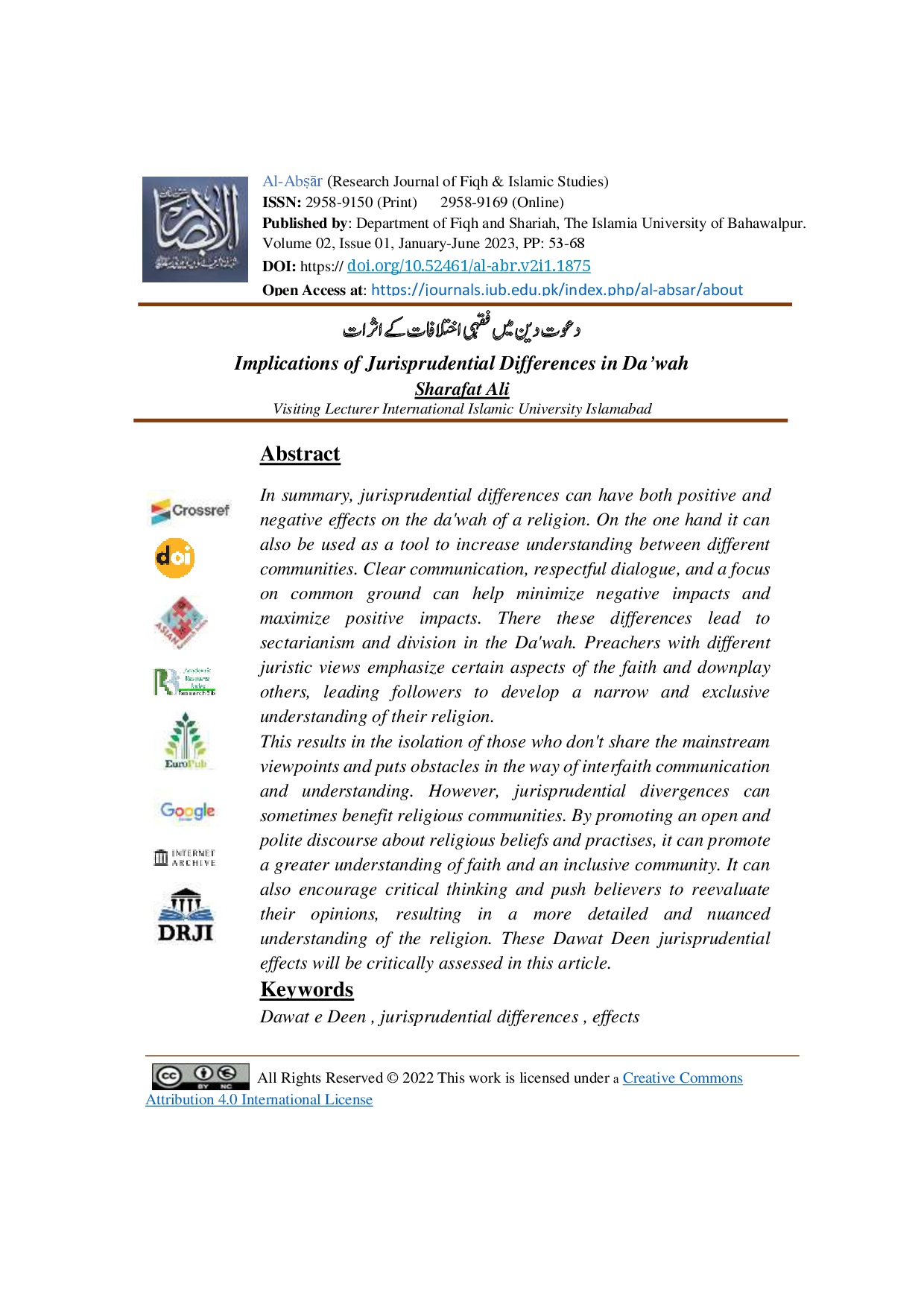Implications of Jurisprudential Differences in Da’wah
دعوت دین میں فقہی اختلافات کے اثرات
DOI:
https://doi.org/10.52461/al-abr.v2i1.1875Keywords:
Dawat e Deen , jurisprudential differences , effectsAbstract
Abstract
In summary, jurisprudential differences can have both positive and negative effects on the da'wah of a religion. On the one hand it can also be used as a tool to increase understanding between different communities. Clear communication, respectful dialogue, and a focus on common ground can help minimize negative impacts and maximize positive impacts. There these differences lead to sectarianism and division in the Da'wah. Preachers with different juristic views emphasize certain aspects of the faith and downplay others, leading followers to develop a narrow and exclusive understanding of their religion.
This results in the isolation of those who don't share the mainstream viewpoints and puts obstacles in the way of interfaith communication and understanding. However, jurisprudential divergences can sometimes benefit religious communities. By promoting an open and polite discourse about religious beliefs and practises, it can promote a greater understanding of faith and an inclusive community. It can also encourage critical thinking and push believers to reevaluate their opinions, resulting in a more detailed and nuanced understanding of the religion. These Dawat Deen jurisprudential effects will be critically assessed in this essay..
Keywords Dawat e Deen , jurisprudential differences , effects
References
القرآن16 : 125۔
Al-Qur'ān 16:125
القرآن 41: 33
Al-Qur'ān 41:33
القرآن16: 44۔
Al-Qur'ān 16:44
البخاری ، محمد بن اسماعیل، کتاب الخوف، باب صلاۃ الطالب راکبا و ایماء، دار احیاء التراث العربی ، بیروت، ط:1، سن:2001، حدیث نمبر:946۔
Al-Bukhārī, Muḥammad ibn Ismāʿīl, Kitāb al-Khauf, Bāb Ṣalāt al-Ṭālib Rākiban wa Iyāmah, Dār Ihyāʾ al-Turāth al-ʿArabī, Beirut, 1st edition, 2001, Ḥadīth number: 946.
اختلافی مسائل میں اعتدال کی راہ، ص: 12۔
Ikhtilāfī Masā'il Mein Itidāl Kī Rāh, p. 12.
امام مالک بن انس ، الموطا، کتاب القدر، باب النھی عن القول بالقدر، دارالفکر، بیروت، 1989ء، حدیث نمبر:1662۔
Imām Mālik ibn Anas, Al-Muwattā, Kitāb al-Qadar, Bāb al-Nahy 'an al-Qawl bi al-Qadar, Dār al-Fikr, Beirut, 1989, ḥadīth number: 1662.
شیرازی، ابو اسحاق، طبقات الفقہاء، دارالقلم بیروت، ص:17۔
Shīrāzī, Abū Isḥāq, Ṭabaqāt al-Fuqahā, Dār al-Qalam, Beirut, p. 17.
استاذ علی الخفیف،اختلاف الفقھاء، دارالفکر العربی،اشاعت دوم،1996ء ، ص:22۔
Ustādh ʿAlī al-Khafīf, Ikhtilāf al-Fuqahāʾ, Dār al-Fikr al-ʿArabī, 2nd edition, 1996 CE, p. 22.

Downloads
Published
How to Cite
Issue
Section
License
Copyright (c) 2023 Al-Abṣār (الابصار)

This work is licensed under a Creative Commons Attribution-NonCommercial 4.0 International License.





